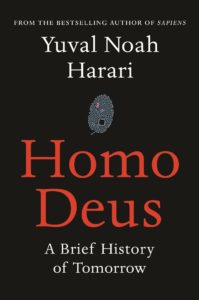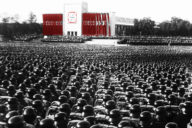By JASON FITZGERALD
A Review of Yuval Noah Harari’s Homo Deus: A Brief History of Tomorrow (Harper, 2017)
 Early in Yuval Noah Harari’s Homo Deus: A Brief History of Tomorrow, the author references “the Chekhov Law,” which dictates that “a gun appearing in the first act of a play will inevitably be fired in the third.” Attributed to playwright Anton Chekhov, the Chekhov Law is used to impress upon the reader how unlikely it is that a nuclear bomb should have been developed and never detonated. Harari goes on to expand the applicability of the Chekhov Law to “other fields of action” besides nuclear warfare. “We,” meaning the human race, appear to “have become experts in breaking… the Chekhov Law,” so that now “if these laws ever do catch up with us, it will be our own fault—not our inescapable destiny.” Like the first act Chekhov describes, Homo Deus lays out all the tensions, conflicts, and dangerous possibilities that face its central protagonist, humankind, priming its audience with anxiety about its fate. The difficulty of this structure is not only that the tension is left unresolved but also that the audience, by being cast in the spectator’s role, is allowed to forget that it is watching something other than a well-made play.
Early in Yuval Noah Harari’s Homo Deus: A Brief History of Tomorrow, the author references “the Chekhov Law,” which dictates that “a gun appearing in the first act of a play will inevitably be fired in the third.” Attributed to playwright Anton Chekhov, the Chekhov Law is used to impress upon the reader how unlikely it is that a nuclear bomb should have been developed and never detonated. Harari goes on to expand the applicability of the Chekhov Law to “other fields of action” besides nuclear warfare. “We,” meaning the human race, appear to “have become experts in breaking… the Chekhov Law,” so that now “if these laws ever do catch up with us, it will be our own fault—not our inescapable destiny.” Like the first act Chekhov describes, Homo Deus lays out all the tensions, conflicts, and dangerous possibilities that face its central protagonist, humankind, priming its audience with anxiety about its fate. The difficulty of this structure is not only that the tension is left unresolved but also that the audience, by being cast in the spectator’s role, is allowed to forget that it is watching something other than a well-made play.
This feat of spectatorial disempowerment is surprising given that, first, the shocking power of the human species is at the heart of Harari’s premise, and second, he locates that power precisely in the capacity to create and manipulate fictions. These precepts undergird the plot of Sapiens, which became an international bestseller upon its English-language publication in 2014, and which is recapitulated in miniature in the sequel. For Harari, it is not humans’ capacity for intelligence or rationality that distinguishes them from the other animals, but rather their capacity for imaginative mythmaking. Whereas animals are only able to organize themselves among familial and small tribal units, humans can organize infinitely massive groups through the production of fictions. These include such entities as nations, corporations, and currency, though Harari’s model is religious. By mediating the relationship between humans and their social and material worlds, religions, defined as abstract systems by which empirical facts and imaginative entities combine into guiding ethical and philosophical principles (a definition broad and secular enough not to require gods), organize the behavior of large collectives whose members remain strangers to one another. For Harari, it is not science but ideology that makes humans special, and the history of the species is the history of the development of this tool.
Three revolutionary events structure that history: the Cognitive Revolution, the Agricultural Revolution, and the Scientific Revolution. While the cognitive revolution made it possible to develop “ideological fictions” in the first place, it was the agricultural revolution that made humans lords over the natural world. Since the scientific revolution, humans have been freed from their obligations to gods and from their dependence on the whims of nature, but they have also turned the universe into “a one-man show.” Sapiens is predominantly a representation of this development, offering only hints of a more revolutionary change to come. Homo Deus picks up the story from there. Its speculative nature carries it from the realm of narrative into the realm of diagnosis and intervention so that, in terms of assessing the author’s politics and values, it is the more consequential work.
Harari argues in Homo Deus that the price of modernity is meaninglessness, but thankfully the human capacity to imagine new “webs of meaning” has been honed enough since caveperson days to invent a religion fit for the secular age—the religion of humanism. Humanism, as Harari understands it, sanctifies human life in general and individual experience in particular, so that rather than appealing for guidance to a deity (or to an institution that speaks for a deity), humanism appeals to “my authentic inner voice.” Feelings and free will, rather than priests and commandments, are the modern era’s unimpeachable authorities. From here, Harari follows a familiar Fukuyama-esque historical narrative by which a particular sect of humanism, namely liberalism, which values individual freedom above all else, has emerged triumphant at the end of the 1914-1989 “humanist wars of religion.” Harari admits that liberalism’s strongest competitors, “socialist humanism” and “evolutionary humanism,” each set out to solve liberalism’s fatal flaw, its inability to determine whose free experience matters most (roughly, socialist humanism sides with the powerless and evolutionary humanism with the powerful). But apparently the flaw wasn’t that serious, since all that had to happen for the competitors to become history’s losers is that the Cold War remain cold long enough for the major communist and totalitarian states to be replaced by liberal democracies.
Unlike Fukuyama of 1989 (and more like Fukuyama of 2002), Harari argues that liberal humanism’s dominance is growing fragile as a new ruling fiction is poised to once again transform the world. Humanism’s replacement, and the unfired gun in Harari’s dramaturgy, he calls “Dataism.” Its god is not humanity but data, and its sacred object is not human individuality but the flow of information—in part because the very concept of the free human individual, the foundation of humanism, has been rendered obsolete by the “life sciences,” which now argue that the autonomous self “is just a fictional tale concocted by an assembly of biochemical algorithms,” and algorithms do not have to be stored in a human brain. In the brave new world of Dataism, massive algorithms will structure our lives according to their calculation of what is best for us—where and how to work, sleep, eat, find happiness, etc. In order to function as “sovereign,” these algorithms will require as much data as possible about human behaviors and desires, rendering experiences into fodder for a larger and larger data set from which more and more accurate decisions can be made. This process, Harari is quick to point out, has already begun as customers give up their personal information, shopping habits, etc to the likes of Google, Facebook, Apple, and other “clouds.”
It is much to Harari’s credit that he presents the Dataist future as dystopian, countering the techno-optimism of many sectors of the science and engineering worlds from which, one hopes, many of Harari’s readers will come. When “freedom of expression” is replaced by “freedom of information,” he explains, privacy will cease to be valued, as will forms of human experience that neither add to the data pile nor conform to the behaviors determined by algorithms to be the most fulfilling. He warns of an “Orwellian police state” in which medicine will make humans dependent on expensive computer technologies and so separate “superhumans” from their neighbors in a “biological caste” system. As this latter example indicates, he is worried not merely about the collapse of liberal individualism but also about the prospects for class warfare on the part of the rich, including the possibility that the wealthy elite will build a “hi-tech Noah’s Ark” to shield them from climate catastrophe while the rest of the species is wiped out.
The future, then, looks bleak, and whatever one might think of Harari’s methods or assumptions, it is at least for this reader entirely believable. But is it inevitable? Here is where the central ambivalence of Homo Deus rises to the level of a contradiction, as the book simultaneously assumes humans’ capacity to shape their own world and casts that agency into doubt. Harari insists that his book offers “possibilities rather than prophecies” and that one is “welcome to think and behave in new ways that will prevent these particular possibilities from materializing.” The purpose of studying the past is “to be liberated from it,” so that by mapping the historical logic that produces a Dataist future he seeks to “give us more options.” Indeed, the opening image of the book is of a “humanity” that “wakes up… washes its face” and asks “what’s on the agenda today”? On the other hand, it’s difficult to tell at what points humanity might intervene and how any other agenda might be realized. Dataism has already become “current scientific dogma” and “is changing our world beyond recognition” whether you “agree” with its precepts or not. There is a “train of progress” that is “pulling out of the station,” and “those who miss this train will never get a second chance.” Moreover, the new scientific and technological developments that will turn Dataist dreams into realities seem to be programmed into human nature, which is “always on the lookout for something better, bigger, tastier,” and this drive for unlimited happiness and immortality will inevitably require the outsourcing of these tasks to nonhuman (and therefore not imperfect) algorithms. And if human nature won’t keep the train moving, the economy will, since “if we somehow succeed in hitting the brakes, our economy will collapse, along with our society.”
This line gives away the game, making diagnosis simpler. Human agency, for Harari, is mediated by capitalism. When he praises human capacity to discover and to innovate, Harari turns to the market as guarantor of those achievements. As long as there’s money and/or market demand, future scientific breakthroughs are all but guaranteed. Capitalism has allowed modern societies “to overcome famine, plague, and war,” and the greatest fiction that humans have devised to organized themselves is neither god nor justice but credit. “Lions can run, jump, claw and bite,” he enthuses, “yet they cannot open a bank account.” The problem, which he is able to acknowledge only in the vaguest terms, is that capitalism does not so much unleash innovative potential as channel it to meet its demands. As the example of climate catastrophe makes especially obvious, those demands often oppose the species’ ability to make the best choices for its collective well-being. While we seem to ride upon its back, it is the capitalist railroad, to adapt Thoreau’s famous quip, that rides upon us, and it does so in the name of facilitating human accomplishment, innovation, and the betterment of our daily lives. In that sense, Dataism is not terribly new at all—it is simply the logic of capitalism in the age of the Internet. Harari all but makes this point explicit when he, with Friedrich Hayek as his citation, argues that capitalism is an especially efficient data processing system that “distributes the work of analysing data and making decisions between many independent but interconnected processors.” What then is so new about Dataism, which places human agency in the hands of external algorithms running the data that we, by living and uploading, pour into it? The market has doing very similar work for at least two centuries.
Harari offers one important difference: Dataism, unlike humanism, has no inherent affinity for democracy. Where individual human experience is a source of authority, democratic governments offer a means of projecting that authority into a political structure. But where feeding information into algorithms is all that matters, democratic politics appear both slow and old-fashioned. “Present-day democratic structures just cannot collect and process the relevant data fast enough,” Harari laments. The situation might improve if political leaders learned how to “lead” their countries rather than simply “manage” them, but management seems to be the new way of things.
Harari’s oddly detached tone about the decline of liberal democracy, his tendency to warn with a nagging figure rather than to rage against a systemic crime, is a symptom of the same attitude toward history that Jacques Derrida discovered when he read Fukuyama (of 1989). Harari treats history as a commodity, not because it has been purchased but in the sense that it appears fully present and knowable because it has been severed from the material forces of its production. It is such a perspective that allows history to be packaged and sold as a commodity (say, in a book called Sapiens), and it explains the frustrating and disempowering feeling one gets from reading Homo Deus after the delightful Epcot ride of the earlier book.
Homo Deus therefore provides a paradigmatic example of the kind of liberal dirge that has emerged among centrist intellectuals in the last decade or so. In this genre, history is still over, leaving the Hegelian dialectic with no major ideological conflicts to churn through. The only difference now, compared to the more optimistic 1990s, is that the future is not simply boring but frightening. What seemed like a light at the end of the Cold War’s tunnel turns out to have been a reflection on the cave wall, and we are speeding towards it. For some, the wall looks like new-fangled fascism, or else like the illiberal democracies that Fareed Zakaria predicted two decades ago and that since the 2017 U.S. election cycle have been especially popular among the commentariat. For others, the future looks like a technological hell, Blade Runner with the Internet in everyone’s cranium. For still others, the wall looks like a burnt, barely livable planet. Harari combines the first two and even forces himself to acknowledge the third. While he dismisses climate catastrophe as a technical problem to be managed early in the book, he returns to the topic twice more as an example of a problem that is not, and might never be, taken care of. Perhaps he might have pursued the topic further if the prospect of climate catastrophe didn’t render his history of tomorrow briefer than the tome he preferred to write.
What makes Homo Deus a particularly interesting liberal dirge is that it is more than a story of technological progress and political inevitability. Harari’s basic theory of human history, that it is driven neither by innovation nor politics but by ideological fictions, allows him to make a more full-throated defense of the academic humanities than most technological dystopians will allow. The humanities, Harari argues, “emphasise the crucial importance of intersubjective entities, which cannot be reduced to hormones and neurons.” In other words, it is humanists, not scientists, who study the stories that shape worlds. In offering up ideology as not only the motor of history but as the foundation of his humanism, a foundation that lies even deeper than liberalism or capitalism, Harari suggests that the capitalist-Dataist train of progress is not humanity’s only possible future, even if he can’t imagine another. And he further suggests that the humanities are a necessary component of any course correction.
Unfortunately his defense quickly turns limp. Only a few pages later Harari makes the strong argument that “humans think they make history, but history actually revolves around the web of stories.” If the stories are really in charge, why bother studying them? Later in the book, he suggests that Dataism is reaching such an interdisciplinary consensus that it will be no longer possible for “scholars in one field… [to] import heretical views from outside.” The question left unanswered is where do ideologies come from, and how can they be rewritten? To Harari’s credit, he does not see ideologies emerging whole cloth out of some cloud of idealism. They are conditioned by a combination of particular historical (or “practical”) needs and a stage in the progress of scientific knowledge. Humanism, for example, is conditioned by the democratic need to mobilize massive armies of people, and by scientific awareness of the impossibility of theological structures (thanks to Darwin, for example). He now sees these conditions breaking down, replaced by a declining technological need for massive groups of laborers (thanks to automation) and threatened by the “life sciences.” His story, though, is too neat, and his dramaturgy too linear. There is no room for the possibility that understanding ideologies means understanding how to remove and replace them. In this sense, he robs the humanities of one of its greatest responsibilities—not only to map the future but to make it possible to see it differently by exposing the structures of power that make the existing stories so effective. It is through the humanities, in other words, that fictions can be transformed from sovereigns back into tools.
Which brings me back to Chekhov, who, when he wrote his famous quip about the gun, was far more frustrated than Harari lets on. The playwright’s point was not that guns must explode, but that when one makes a play about a gun, one sutures the ending onto the premise, and the robotic plot that results is unable to reveal anything new about human experience. What is needed, then, is a different kind of narrative, one that does not cock a weapon and implant in its spectators the anticipation of its firing. Chekhov spent the last decade of his life struggling to find that narrative. Guns fire in The Seagull, Uncle Vanya, and Three Sisters, but always offstage, and in each case with less and less consequence for the play’s characters. With The Cherry Orchard he finally found a story that was about the threat to the imagination posed by the cocked gun. In that play, he replaced the firearm with an ax, poised to cut down a grove of cherry trees whose owners, suffering from severe lack of imagination, give up on every opportunity to save it. Chekhov’s final drama, arguably the first play of the anthropocene, managed to match his critique of narrative inevitability with his chief political target, the ennui of the upper classes, for whom the future seemed so determined they were unable to conceive of the revolution that would topple them in a matter of decades.
The lesson of that play, and of the humanities in general, is that uncocking the gun begins not with an act of will but with an act of imagination. Homo Deus rewrites The Cherry Orchard without the critical perspective of that play. Thankfully, because his historical purview is tens of thousands of years long, he has, despite himself, been forced to develop a theory of history that does not depend upon capitalism, even if it culminates in it. Fictions lie at the center of that theory, and the tools to do more than simply retell them are the tools of what one might call humanism, which has always reserved for itself the power to change the narrative, to look past the cocked gun and see the hand that wields it.
***
Jason Fitzgerald earned his PhD in Theatre from the Columbia University English department in 2017. He is currently teaching at Purchase College and at Columbia University.






No Comments